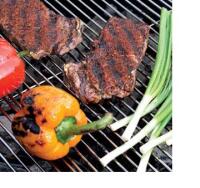 Recovery from a workout is just as important as the workout itself. Post-exercise foods and drinks can affect recovery in the following areas: fatigue, repletion of glycogen stores, muscle repair, and preparation for future exercise.
Recovery from a workout is just as important as the workout itself. Post-exercise foods and drinks can affect recovery in the following areas: fatigue, repletion of glycogen stores, muscle repair, and preparation for future exercise.
Recreational exercisers who work out 3 – 4 days a week need good nutrition to maintain their glycogen stores. For the more vigorous exerciser who works out several times a day, is training, or performing competitively, replenishing glycogen stores and assisting the body is recovery is extremely important.
Repletion of fluid loss is the most essential part of recovery after a hard workout. Water is lost through sweat; good water balance is managed best by drinking water throughout the workout and after the workout is complete. To calculate how much water to drink, weigh yourself before and after a workout. For each pound lost, drink 16 ounces of fluid. Reach for water, juice, high-carbohydrate sports drinks and high-water-content fruits such as melons, grapes, and oranges.
Repletion of muscle glycogen stores should be done within 15 minutes after the workout has ended. Aim for 1 gram of carbohydrate for every 2 pounds of body weight/hour. Consume this in 30 minute intervals over the next 4 – 5 hours.
For example, a 150 pound person should have 75 grams of carbohydrate. Each gram of carbohydrate = 4 calories, so a total of 300 carbohydrate calories. The person should consume 300 calories 15 minutes after exercising during the first hour, and 150 calories each half hour for the next 3 – 4 hours to maximize glycogen repletion.
The carbohydrate calories being consumed can come from food or drink. The following all have 300 carbohydrate calories: 8 fluid ounces of orange juice and 2 slices of bread; 12 – 15 fluid ounces of juice or sports drink and a low-fat fruit yogurt; or a cereal with milk and a banana.
Eat protein post-workout to aid in repair of damaged muscle tissue, reduce the response from the stress hormone cortisol, and to stimulate development of new tissue. Choose quality proteins like your lean meats, eggs, milk, cottage cheese, and beans. Consuming 10 – 20 grams of protein after a hard workout is enough. Don’t go overboard with 40 – 50 or even more grams of protein. An egg has about 7 grams of protein, a cup of milk has 12 grams, and a small chicken breast about 25 grams.
Repletion of sodium, potassium, and electrolytes lost through sweat is easy to do through food and drink. Supplementation is not always necessary. Foods that are high in essential electrolytes include potatoes, yogurt, orange juice, bananas, soup, cereals, cheese, and breads.
Connect With Us
See the latest from Fleet Feet Sports Fox Valley